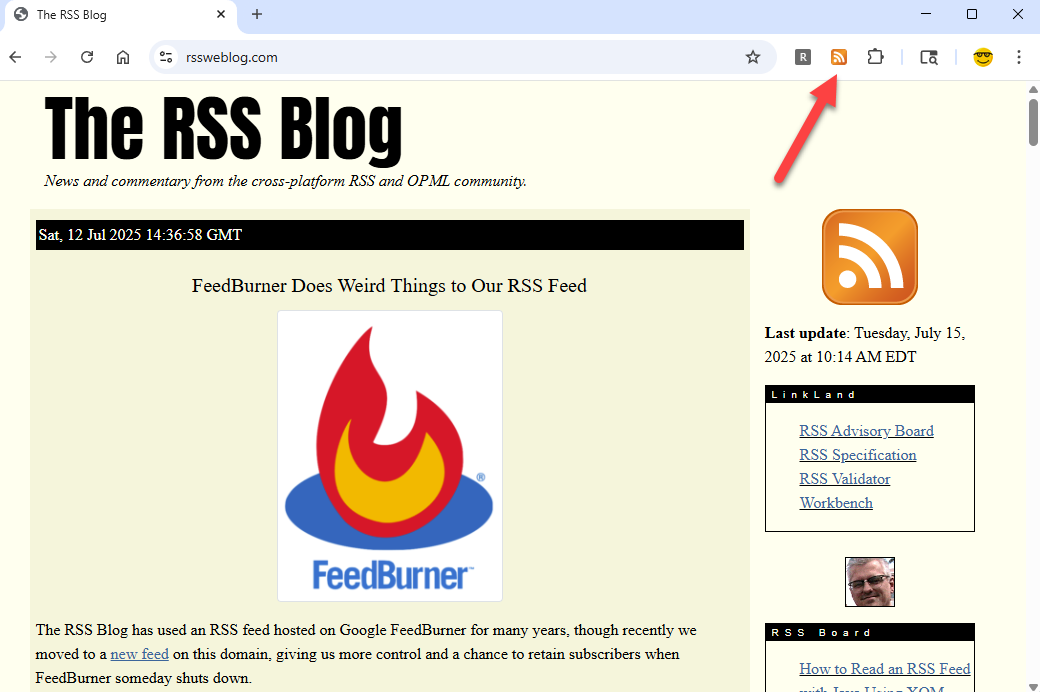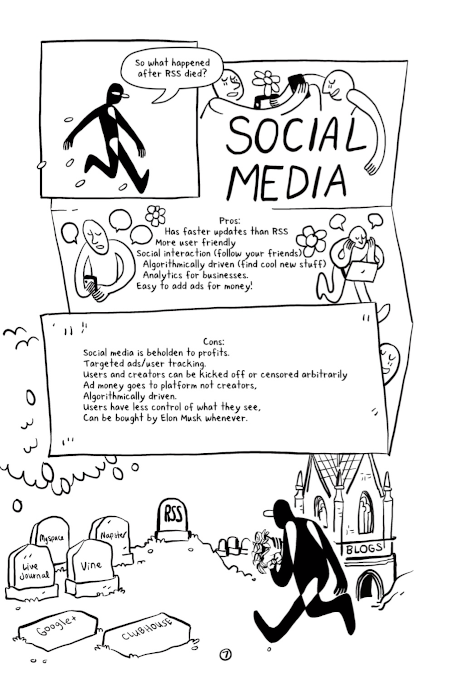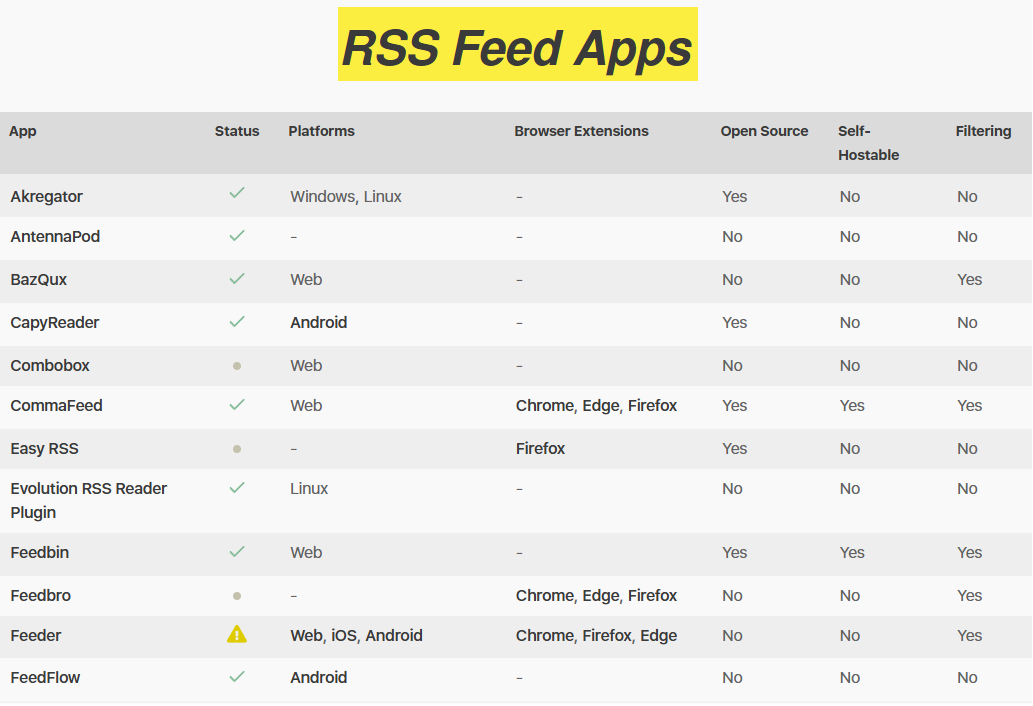The ability of sites to be found on the web has become increasingly difficult with social media platforms penalizing posts that contain links, mountains of AI slop ranking above legitimate sites and Google showing users AI summaries that reword information instead of sending searchers to the originators.
The programmer and writer Molly White says there's a way to read the sites you care about without going through all these malicious middlemen: Start using RSS.
Many, if not most, websites publish an RSS feed. Whereas you can only follow a Twitter user on Twitter or a Substack writer in the Substack app, you can follow any website with an RSS feed in a feed reader. When you open it, all your reading is neatly waiting for you in one place, like a morning newspaper. And RSS is more of a one-way street from a privacy perspective, pushing writing out to you with less of your data flowing back to the publisher.
Fewer websites these days advertise their RSS feeds, and I've seen some people take this to mean they don’t support RSS anymore. They often still do -- you just need to use a feed reader to find the feed, rather than copying-and-pasting an RSS link from your browser. My feed reader has a handy browser extension that glows orange if it detects an RSS feed on the website you're visiting, and lets you quickly add it to your feed reader.
I will note that some tracking is still possible. For example, some platforms will replace links in newsletters with link forwarders that first track the click and then re-route you to the intended destination, and this is something that could feasibly expand to RSS. However, this is somewhat uncommon in my experience -- while you will see this kind of linking a lot in email newsletters sent from practically any platform (Substack, Beehiiv, Buttondown, and Ghost all offer the "feature", and it's often something a writer has to go out of their way to turn off), at least as of writing, these tracking links are typically not present in RSS feeds from those same platforms unless you are using email ingestion.
I've been heavily using RSS for over a decade, and it's a travesty more people aren't familiar with it. ...
RSS offers readers and writers a path away from unreliable, manipulative, and hostile platforms and intermediaries. In a media landscape dominated by algorithmic feeds that aim to manipulate and extract, sometimes the most radical thing you can do is choose to read what you want, when you want, without anyone watching over your shoulder.
White offers a tutorial for RSS beginners at the link. One of her best suggestions is to not worry too much about picking an RSS reader. You can easily switch from one to another by exporting your OPML subscription list.
Categories: RSS, RSS Readers, Molly White

The Spanish public broadcaster RTVE has begun blocking the podcast media files for its radio station RNE from being downloaded by some podcasting apps, reports James Cridland for Podnews:
One such podcast app that RNE is blocking is AntennaPod, a free podcast app on Android. It's one of the most popular apps on Android -- and in Spain, 78.8% of Spanish mobile phone users use Android mobile phones.
Users have discovered that RNE is specifically blocking AntennaPod, based on the app’s user agent, which is correctly set for every download. It’s unclear why: The app contains no advertising, and is open-source. It's free to download, and acts in accordance with the unwritten contract between podcast publishers and apps. ...
RNE continues to publish open RSS feeds, so the broadcaster's shows appear in podcast apps -- but the audio isn't available. This means that RNE shows appear without any issue -- but don't play in some of them, causing audiences to think that the app, rather than the publisher, is at fault.
Blocking RSS feeds or their enclosures is antithetical to the spirit of the open web. Putting something in a public RSS feed says you want it to be downloaded by whatever software a listener chooses to use.
RTVE claims the move was justified because some apps are making money off their podcasts. A block based on user agents could be easily circumvented, since declaring one in an HTTP request is voluntary. AntennaPod users are being denied their listening choices because the app is conscientious enough to tell feed publishers its identity.
Categories: RSS, Podcasting, AntennaPod

Because there's now an RSS feed for this weblog hosted locally at https://rssweblog.com/rss-feed, the server logs reveal the RSS readers and other software that regularly check the feed for updates -- at least the ones that report themselves in the user agent of their HTTP requests. Here are some that have turned up in the first 10 days.
RSS-to-Telegram Bot (RSStT)
RSS-to-Telegram Bot, also called RSStT, is an open source bot that forwards RSS and Atom feeds to Telegram users. I hadn't heard of it before but it looks robust and well-supported. The software is localized in several languages. Feed items can be sent as messages or articles on the instant messaging service, retaining rich text, images, audio and video. The import and export of OPML subscription lists is supported.
FeedParser
FeedParser is a Python library developed by Kurt McKee that has been in active development since 2002 and is in version 6.0.11. FeedParser supports all versions of RSS from 0.9 to 2.0, Atom 0.3 and 1.0, CDF and RSS-RDF. Extensions including Dublin Core and iTunes are handled. FeedParser also offers advanced HTTP processing such as reading ETag and Last Modified headers, following redirects and reading feeds that require user credentials. In a sign of its longevity and popularity, it is included in several major Linux distributions.
NetNewsWire
No research was required for this one. NetNewsWire, a longtime favorite of this blog, is a free RSS and Atom reader for Mac, iPhone and iPad that first came out in 2002. It was created by Brent Simmons, a former member of the RSS Advisory Board. NewsGator Technologies acquired it but Brent Simmons got it back in 2018 and released versions 5.0 and later under an open source license. I've been using the iOS version on my phone for years.
Categories: RSS, RSS Readers, NetNewsWire, RSStT, FeedParser, Brent Simmons

The major browsers used to indicate that a website had an RSS feed by displaying the orange RSS icon in the address bar at the far right of the bar. This no longer happens but an extension offered by Google's Ireland division adds it back to Chrome.
The RSS Subscription Extension looks for a site's feeds using RSS Autodiscovery. A feed is identified using a link element in the page header.
After you install the extension, click the three-dot kebab menu in the browser's upper right corner, then choose Extensions > Manage Extensions. A page opens listing the extensions on your browser. Click the Details button for the RSS Subscription Extension and toggle the Pin to Toolbar setting.
The RSS Blog identifies its RSS feed with this HTML in the head section:
<link rel="alternate" type="application/rss+xml" title="The RSS Blog" href="https://rssweblog.com/rss-feed" />
If you have the RSS Subscription Extension with the Toolbar visible, the RSS icon in the toolbar changes from gray to orange when you're visiting this blog. When the icon is clicked a page opens displaying recent feed items with a Subscribe Now button and a drop-down containing five readers as choices along with Manage. The current selection of readers is Newsblur, My Yahoo, Feedly, Inoreader and The Old Reader.
A page can contain more than one link element when it has multiple feeds, such as the example of a website that has a feed for blog posts and another for comments. Clicking the orange RSS icon opens a drop-down menu of these feeds, which can be chosen to open the Subscribe Now page for that feed.
A lot of Chrome extensions are hard to trust because they come from a publisher you don't know or have a low download count. This one comes from Google and has been installed 400,000 times. The person we found about it from on Mastodon said they've been using it for four years.
Categories: RSS, RSS Autodiscovery, Google Chrome

The RSS Blog has used an RSS feed hosted on Google FeedBurner for many years, though recently we moved to a new feed on this domain, giving us more control and a chance to retain subscribers when FeedBurner someday shuts down.
FeedBurner is putting things in the feed that aren't in the source feed we provide to the service, like these channel-level elements from the itunes namespace:
<itunes:keywords>bad,podcast</itunes:keywords>
<itunes:summary>If I ever do a podcast, I guess this'll be the description.</itunes:summary>
<itunes:subtitle>If I ever do a podcast, I guess this'll be the description.</itunes:subtitle>
<itunes:category text="Technology">
<itunes:category text="Podcasting"/>
</itunes:category>
It also adds enclosure elements to items that don't contain media enclosures -- along with more itunes elements. Unfortunately, the elements FeedBurner puts in cause the feed to fail validation in the RSS Validator.
After some digging I found that this weirdness is happening because at some point the FeedBurner settings for the feed turned on SmartCast, an enhancement that enables feeds to support podcasts when an item in contains one. Here's some documentation explaining the process:
When composing a new posting with your publishing tool, simply insert a link to your podcast content directly into the text. FeedBurner will take the first anchor (<a>) tag that it finds in your posting content and convert the linked URL into an RSS 2.0 <enclosure> element if FeedBurner detects the item is in a popular audio, video, or streaming media format. This conversion turns this feed item into content that current podcasting clients will download for use (see a list of clients at the bottom of this post).
This functionality was a boon for bloggers on platforms that didn't support podcasting yet.
Our RSS feed doesn't contain any podcasts. We can't turn off SmartCast without our old FeedBurner account, but this post should help some publishers whose feeds also have become haunted by phantom podcasting tags.
Categories: RSS, FeedBurner, RSS Feeds, SmartCast
The story of RSS has been told in fanzine form by cartoonist Audra McNamee and contributor Allia Service in RSS is (Not) Dead (Yet). The 12-page comic released in 2023 describes how the original RSS boom died 10 years earlier when Google Reader shut down, after which the rise of social media did further harm by pulling users into silos and rejecting the ethos of the open web.

McNamee and Service go on to tell how RSS has experienced another boom with the enormous popularity of podcasting. But they argue that it is again under threat from the same kind of corporate greed:
Podcast streamers are buying up podcast media companies and targeted advertising companies, and trying to monopolize distribution (e.g. get everyone to use their app.
I felt very seen by the part about infighting and "warring visions" within the RSS community. It hasn't always been easy to be a member of the RSS Advisory Board, but there's some satisfaction in seeing how much RSS still matters today. McNamee and Service did a charming job of making that point.
Categories: RSS, Podcasting, RSS Is Dead, Audra McNamee, Allia Service
The non-profit advocacy group Open RSS has an interesting RSS scoreboard that rates the RSS readers that request its feeds, indicating whether they meet the following criteria: open source, self-hostable, filtering, search, folders, import/export, full-text mode, mark read on scroll, sorting, custom rules, language translation and offline reading. The page also indicates whether they have browser extensions and what operating systems they're on.

This is too much information for a casual RSS user, but as an experienced consumer of feeds I appreciate being able to shop around for a new reader based on the features I care about. Open RSS has compiled a lot of information in one place. A reader I'm thinking about using, Miniflux, supports all but two features on the list!
Open RSS gives each reader an overall status score (hover over the icons in the row to see them):
- Green check mark: This app is likely compatible with RSS feeds
- Yellow warning triangle: This app has unresolved issues that may cause RSS feeds not to so work well when used in the application
- Red stop circle: This reader remains incompatible with RSS feeds due to the overwhelming amount of unresolved issues its owners refuse to resolve
- Red stop circle: This reader is no longer maintained and is known to be incompatible with RSS feeds
- Gray dot: The status of this application hasn't been determined yet
The popular RSS reader Inoreader scores particularly badly, as detailed on a page listing all of the problems. According to Open RSS, Inoreader uses multiple networks "to request feeds too frequently," does not identify itself, requests feeds from the wrong URLs and does not update feed requests.
Categories: RSS, Open RSS, Inoreader, Miniflux, RSS Readers

